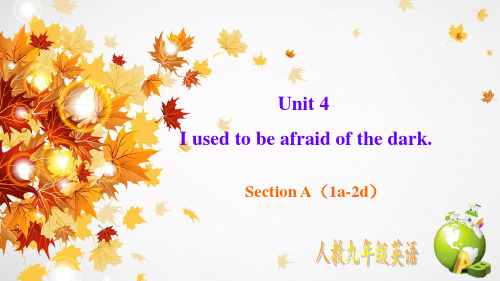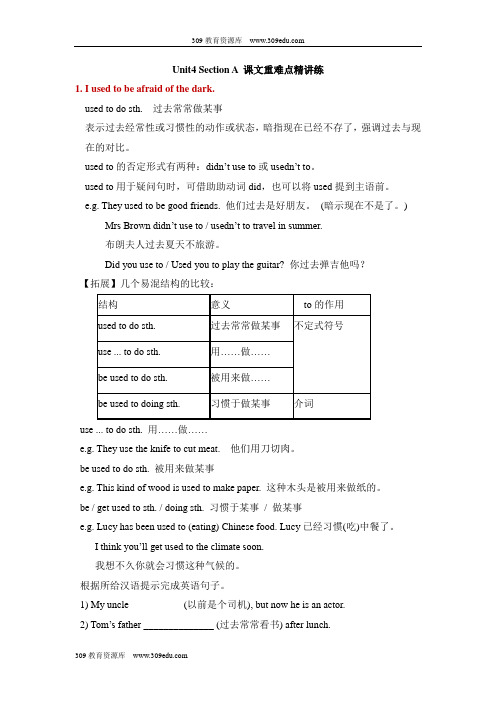2014秋九年级unit4 SectionA课文知识点讲解SectionA
人教版九年级全一册英语Unit4 Section A Grammar Focus4c

adj. 非洲 (人)的 n. 欧洲人 n. 非洲人
_J_e_rr_y__u_s_e_d_t_o_r_e_a_d__b_o_o_k_s_o_n__E_u_r_o_p_e_a_n____
_h_is_t_o_r_y_. S__h_e_d_i_d_n_’_t_u_s_e_t_o_r_e_a_d__b_o_o_k_s_o_n___ _A_f_r_ic_a_n__c_u_lt_u_r_e_. ______________________
A. to drive; to drive
B. driving; driving
C. to driving; to drive
D. to drive; to driving
典例精析
2. This kind of cloth is used _________ dress. A. to making B. to make C. to be made D. making
Unit 4 I used to be afraid of the
dark.
Section A (Grammar Focus-4c)
学习目标
➢ Key words & phrases:
European, African, British, speech, public, in public
➢ Key sentences:
1. Emily used to listen to pop music, but now she enjoys country music.
2. Emily used to watch scary movies, but now she hates scary movies.
2014秋新目标九年级上Unit4 Section A 4a-4c课件(共32张PPT)

用used to句型说出与图片情景相符的句子。 Peter, soccer Mike, glasses Mark, Amy, like long swim hair Jenny
过去常常 ”, 表示 过去的习惯 used to “__________ ___________ used to + ___________ 动词原形 Peterused used to play soccer. Amy to have long hair. but now … , 对比现在和过去 : _____________________ Mark used to like swimming. Mike used to not wear play the glasses. piano. but notJenny any more, but any longer ____________________________________
To learn to use sentence pattern Used to ...
当单词或短语出现时,请迅速读 出并说出中文意思。
n
Grammar Focus
I used to be short
Paula used to be really quiet. You used to be short, didn’t you? Did he use to wear glasses? I didn’t use to be popular in school. She didn’t use to like tests. Yes, I did./No, I didn’t. Yes, he did./No, he didn’t.
What does he look like now?
九年级英语上册Unit4 section A 1a-2d

课文解析
1) Silent 的副词形式是silently (默默的;静静的)。 例: He went in to the classroom and sat down silently. 他走进教室静静地坐下来。
2) keep silent意为“保持安静” 例: Please keep silent in public places. 在公共场合下请保持安静。
PPT模板下载:www.1p pt.co m/ moban / 节日PPT模板:www.1p pt.co m/ jieri/ PPT背景图片:www.1p pt.co m/ beijing / 优秀PPT下载:www.1p pt.co m/ xiazai/ Word教程: /word/ 资料下载:www. 1ppt.co m/zilia o/ 范文下载:www. 1ppt.co m/fan wen/ 教案下载:www. 1ppt.co m/jiao an/
such与so 辨析:
such为形容词,意为“这(那)样的;主要修饰名词; so是副词,意为“这(那)么;如此地”,主要修饰形容词、 副词和分词。
课文解析
当名词前有many,much,few或little等词修饰时,要用so而不 用such。
例: There are so many / few people in the hall. 大厅有这么多/这么少的人。 You have so much / little homework today. 你今天有这么多/这么少的作业。
Unit 4 I used to be afraid of the dark.
Section A(1a-2d)
Hale Waihona Puke 课前预习Today we’ll talk about what people used to be
人教版英语九年级全册Unit4(备课精品):Section A 课文重难点精讲练

Unit4 Section A 课文重难点精讲练1. I used to be afraid of the dark.used to do sth. 过去常常做某事表示过去经常性或习惯性的动作或状态,暗指现在已经不存了,强调过去与现在的对比。
used to的否定形式有两种:didn’t use to或usedn’t to。
used to用于疑问句时,可借助助动词did,也可以将used提到主语前。
e.g. They used to be good friends. 他们过去是好朋友。
(暗示现在不是了。
)Mrs Brown didn’t use to / usedn’t to travel in summer.布朗夫人过去夏天不旅游。
Did you use to / Used you to play the guitar? 你过去弹吉他吗?【拓展】几个易混结构的比较:use ... to do sth. 用……做……e.g. They use the knife to cut meat. 他们用刀切肉。
be used to do sth. 被用来做某事e.g. This kind of wood is used to make paper. 这种木头是被用来做纸的。
be / get used to sth. / doing sth. 习惯于某事/ 做某事e.g. Lucy has been used to (eating) Chinese food. Lucy已经习惯(吃)中餐了。
I think you’ll get used to the climate soon.我想不久你就会习惯这种气候的。
根据所给汉语提示完成英语句子。
1) My uncle __________ (以前是个司机), but now he is an actor.2) Tom’s father ______________ (过去常常看书) after lunch.3) Mary ________ (以前常常骑自行车) to work, but now she _______ (习惯步行)to work.4) The pencil ________ (被用来书写).2. She still plays the piano from time to time.from time to time是一个固定短语,意为“间或;有时”,常在句中作状语。
2014新人教版九年级英语unit4 SectionA 2a-2c

Past
I used to forget my mom’s birthday. I used to spit in the street. …… ……
Now
I kiss my mom and say ―I love you‖ on her birthday. I become a volunteer in an environment group.
B 【2011本溪】Sally is ______ in class now, but she used to be a very shy girl. A. honest B. silent C. quiet D. active ilent 【2012山东济宁】Ann kept s_________ all day because his little brother broke her toy bear.
2b Listen again and complete the chart about how Paula has changed. In the past
Paula used to be really quiet She was always _____. silent in class. She wasn’t outgoing She was very ____. never brave enough to ask questions. She got good grades in science ____. She was also good in _____. She used to play music class the ______. piano
⊙ Sometimes we make Mr. Yu happy. Sometimes we make him angry.
九年级上册英语第四单元A部分知识点

九年级上册英语第四单元A部分知识点在九年级上册英语课本的第四单元A部分中,我们学习了许多有趣且实用的知识点。
这些知识点涵盖了日常生活中的各个方面,从购物到旅行,从城市生活到健康与安全。
下面我们将对这些知识点逐一进行讨论。
首先,第一部分是关于购物的。
本单元中介绍了一些常用的购物场所和购物用语。
我们了解到了不同的商店类型以及在购物中应该如何表达自己的需要。
此外,在这一部分还学习了讲述服装的颜色、尺码以及款式等相关知识。
这将帮助我们更好地选择适合自己的服装。
接下来,第二部分是关于旅行的。
这部分教授了我们如何预订机票、订酒店以及询问和指引路线等旅行相关的知识。
我们可以学习到如何与他人交流旅行计划,比如询问最佳的交通方式和了解景点的开放时间等等。
这些对于我们今后的旅行计划将非常有帮助。
第三部分是关于城市生活的。
在这一部分中,我们学习了如何与他人讨论城市中的运输和地点。
我们可以学会如何向他人问询如何搭乘公共交通工具,也可以了解到很多城市中的标志性地点。
此外,我们还学习了如何表达自己对城市的看法,以及提出改进建议。
第四部分是关于健康与安全的。
这一部分教授了我们一些有关保持健康和解决常见健康问题的知识。
我们学会了如何向医生描述自己的症状,并寻求帮助。
在这一部分中,还对文化差异进行了一些介绍,比如在不同国家中寻求医疗帮助的方式可能会有所不同。
总之,九年级上册英语第四单元A部分提供了丰富的实用知识,帮助我们更好地适应日常生活的各种场景。
通过学习这些知识点,我们能够更流利、自信地与他人进行交流,提高自己的英语能力。
这些知识点在我们的学习和实践中将会起到重要的作用,希望我们能够善加利用,并不断学习、提高。
通过这篇文章的介绍,我们对九年级上册英语第四单元A部分的知识点有了一个初步的了解。
这些知识点将在我们的学习中起到积极的作用。
希望我们能够充分掌握这些知识,不仅在课堂上灵活运用,也能够在实际生活中实现语言的应用。
愿我们在英语学习的旅程中取得更大的进步!。
2014年秋九年级英语unit-4-Section-A-4a-4c(新版人教版)精选教学PPT

❖Paula used to be really quiet . ❖ 她过去不喜欢考试。
❖She didn’t use to like tests.
❖ 你过去很矮,不是吗? ❖You used to be short, didn’t you ? ❖ 是的,我矮。不,我不矮。 ❖Yes, I did. \ No ,I didn’t. ❖ 他过去常常戴眼镜吗? ❖Did he use to wear glasses? ❖ 是的,他戴。不,他不戴。 ❖Yes, he did. \ No ,he didn’t.
4b look at the information and write sentences about Emily.
❖E.g. Emily didn’t use to eat a lot of vegetables, but now she love carrots and tomatoes.
Emily used to listen to pop music, but now she enjoys country music.
of_____ in front of a group. ❖ 6. 汤姆变了很多,我几乎认不出他了。 ❖ Tom has changed_______ _______; ❖ I can________ recognize him.
❖7. 我过去常常花许多时间和朋友们玩游 戏,但是我不再有时间玩了。
_W__h_a_t_ __d_i_d__ your brother __u_s_e__ ___to___ __d_o___ when he was a child?
人教版九年级Unit 4 Section A 单词、短语、知识点默写及短文填空

人教版九年级全一册Unit 4 Section A单词、短语、知识点默写及短文填空一、单词1.有幽默感的;滑稽有趣的2.不说话的;沉默的3.有用的;有帮助的4.时常;有时5.得分;进球6.背景7.v.采访;面试n.面试;面谈8.亚洲的;亚洲人的,亚洲人9.对付;对待10.应对;处理11.害羞;腼腆12.敢于;胆敢13.人群;群众14.吨;大量;许多15.私人的;私密的16.警卫;看守v.守卫;保卫17.需要;要求18.欧洲(人)的;欧洲人欧洲19.非洲(人)的;非洲人亚洲20.英国的;英国人的21.讲话;发言22.n.民众adj.公开的;公众的23.公开地;在别人(尤指生人)面前24.有好的25.严肃的;稳重的26.文静的;安静的二、短语1.害怕.....2.曾经;过去常常3.过去很矮4.过去戴着眼镜5.习惯于做某事6.某人什么样/是什么样的人?(询问性格;品质,也可询问相貌)7.某人长得什么样?(询问相貌)8.某人喜欢什么?9.足够勇敢10.足够.....可以做某事11.取得好成绩12.时常;有时13.如此好的一个主意14.自从....以来已经有多长时间了15.看见某人正在做某事16.戴眼镜17.一个19岁的歌手18.一个8岁的男孩19.学着做;开始做;占据;占用20.处理;应对21.敢于做某事22.在.....前面在....的前部23.不再24.许多的;大量的25.担心26. 太多三、短文填空From Shy Girl to Pop StartFor this month’s Young World magazine, I__________ (interview) 19-year-old Asian pop star Candy Wang. Candy ________ (tell) me that she used to really shy and ________ (take) up singing _________ (deal) with her _____(shy). As she ____ (get) better, she dared _______ (sing) in front her class, and then the wholeschool. Now she’s not shy anymore and loves _________ (sing) in front of crowds.I asked Candy how life was different after she_______ (become) famous. She explained that there are many good things, like (be) able to (travel) and( meet )new people all the time. “I (not use) to be popular in school, but now I get tons attention everywhere I go.” However, too much attention can also be a bad thing. “I always have to _______ (worry) about I appear to others and I have to be very (care)about what I say or do. And I don’t have much private time anymore. _____ (hang) out with friends is almost impossible for me now because there are always guards around me.”What does Candy have to______ (say) to all those young people who want to become famous? “Well,” she ______(begin) slowly, “you have to be________ (prepare)to give up your normal life”. You can never _______ (imagine) how difficult the road to success____ (be). Many times I thought about _____ (give) up, but I ( fight) on. You really require a lot of talent and hard work (succeed). Only a very small number of people (make) it to the top.”。
- 1、下载文档前请自行甄别文档内容的完整性,平台不提供额外的编辑、内容补充、找答案等附加服务。
- 2、"仅部分预览"的文档,不可在线预览部分如存在完整性等问题,可反馈申请退款(可完整预览的文档不适用该条件!)。
- 3、如文档侵犯您的权益,请联系客服反馈,我们会尽快为您处理(人工客服工作时间:9:00-18:30)。
【用法归纳】 【辨析】:used to do sth, be used to do sth. be used to doing sth. used to “过去常常”(后接动词不定式, 表示过去的习惯)。 否定式有两种: did not use to或used not to。 疑问式有两种: e to...?或Used...to do...? 但常用第一种。答语形式与did和 used的形式一致。
【湖北岳阳】I knew it was impossible for me to go to work on time (按时上班) when I missed __________ the last bus. 【山东东营】Tom didn’t go to school _____ this morning because he overslept. A. at once B. on time C. by accident D. at present 【2011云南中考】85. As students, we should study hard, at _______ it ’s important the same time for us to get on well with others. (同时) 【2013湖北黄石4】The teacher hope all of us can hand ____ our homework ____time every day. A. up ; in B. out; on C. on; in D. in ; on
4.friendly adj.友好的
【解析】be friendly to=be good to=be kind to“对什么友好” friend →friendship n 友谊 make friends (with)与某人交朋友 friendly → (比)friendlier →friendliest
【2014山东威海】32.To my surprise , my brother can speak English_____. A.lively B.perfectly C.badly D.friendly 【2014十堰中考】30. It’s very friendly _____ him to help me when I’m in trouble. A. of B. with C. to D. in
②Did + 主语+ use + to do ….? 答语: Yes, 主语+ did./ No, 主语+ didn’t Used he to go to school on foot? = Did he use to go to school on foot?
(四) 反意疑问句: 肯定句+ didn’t /usedn’t+ 主语? He used to be very rich, didn’t he/ usedn’t he? 否定句+ did /used +主语? He didn’t use to smoke, to telldid /used he? ①My mother used_________(tell)us story when we were young. B ( ) ②He used to ____short and ____ short hair when he was young. A. have; be B. be; have
【拓展】(一) 肯定形式:主语+used to+do… I used to get up at six. (二) 否定形式:主语+ usedn’t /didn’t use +to do … He usedn’t to study hard.= He didn’t use to study hard. (三)疑问形式: ① Used +主语+ to do sth …? 答语: Yes, 主语+used to./ No, 主语+ usedn’t to
5.She was always silent in class 在课堂 上她总是很沉默。 【解析】silence n 沉默 → silent 沉默;缄 默;无声 in silence 沉默地、无声地 = silently keep silent 保持沉默
【2012山东烟台】When he heard the bad news, Robert walked home together with his friends ____________. in silence(沉默地) ( )① We should keep ____ in the library.
(3) enoughnough to do sth. His sister is old enough _______ to go (go) to school. 【2013浙江杭州】She’s not strong enough ___ walking up mountains. A.to go B.going C.go D.went
Unit4 I used to be afraid of the dark
Section A
1. — Mario, you used to be short, didn’t you?马里奥,你以前个子矮,对吗? — Yes, I did. 是的。 【解析1】 (1) use v.使用→useful adj. 有用的 use up 用完 useful Studying English is__________(use). (2) use sth to do sth 用某物做某事 We use Internet __________(find) information. to find (3) used to do sth 过去常常做某事,表示过去做 过的事现在已经不做,只用于过去时态。 ◆变成否定句或疑问句时要借助助动词
【2014山东枣庄]Liu Huan, a famous male singer, has long hair, because he ______ long hair. B A. used to have B. is used to having C. is used for having D. is used to have 【2014湖北黄冈】- Grandpa has changed a lot. A - So he has. He spends more time than he used to ______ games with the children. A. play B. playing C. played D. plays 【解析2】反意疑问句(见单元语法) 2.appearance [əˈp ɪərəns] n (人或物的)外表;外貌,外观;仪表 make one's appearance 登台;出现
◆used to do sth. “过去常常做某事”(而现在已经不做了), 表示过去习惯性、经常性的动作或状态,和现在对比,暗 示现在不做了。 to为不定式符号,后跟动词原形。: I used to go shopping on Saturdays, but now I no longer do so. 过去我经常星期六去购物,但现在我不再那样了。 ◆be used to do sth. 表示被动,“.....被用来做……”。 Computers are used to help people do many things. 电脑被用来帮助人们做很多事情。 ◆be used to doing something. “习惯于做某事”。 to 在这里是介词,后接名词或动名词。 The teacher is used to going to bed late in the evening. 那个老师习惯于晚睡觉。
7. She was never brave enough to ask questions. 【解析】enough (1)adj. “足够的“ 作表语和定语,修 饰名词时,可放在名词之前或之后。 We have enough time _______(finish) the work. (2) adv 充分地,足够地 修饰形容词和副词,放在形容 词和副词之后。 My coat isn’t new enough. 【2013贺州】 48. This movie wasn’t ______. He fell asleep half way through it. A. interesting enough B. enough interesting C. interested enough D. enough interested 【2013绥化】26. — How do you like the talk show? — I think it’s _____, but some people think it’s so________. A. wonderful enough; bored B. enough wonderful; boring
( her. A. in silent
A. silence B. silent C. silences ) ②They stood ____ as a mark of honor to B. in silence C. silence
6.She still plays the ___from time to time. 她仍然时常弹____ 【解析】from time to time= sometimes / at times. 时常,有时 She goes to the movies from time to time. 【time短语】at times=sometimes 有时 have a good time 玩得高兴 have time =be free 有空 all the time 一直 at the same time 同时 by the time 到时候 for the first time 第一次 take one’s time从容不迫 【句型】 It’s time to do sth =It’s time for sth 是该做某事的时间了 It takes sb. some time to do sth 做某事花费某人多长 时间s
